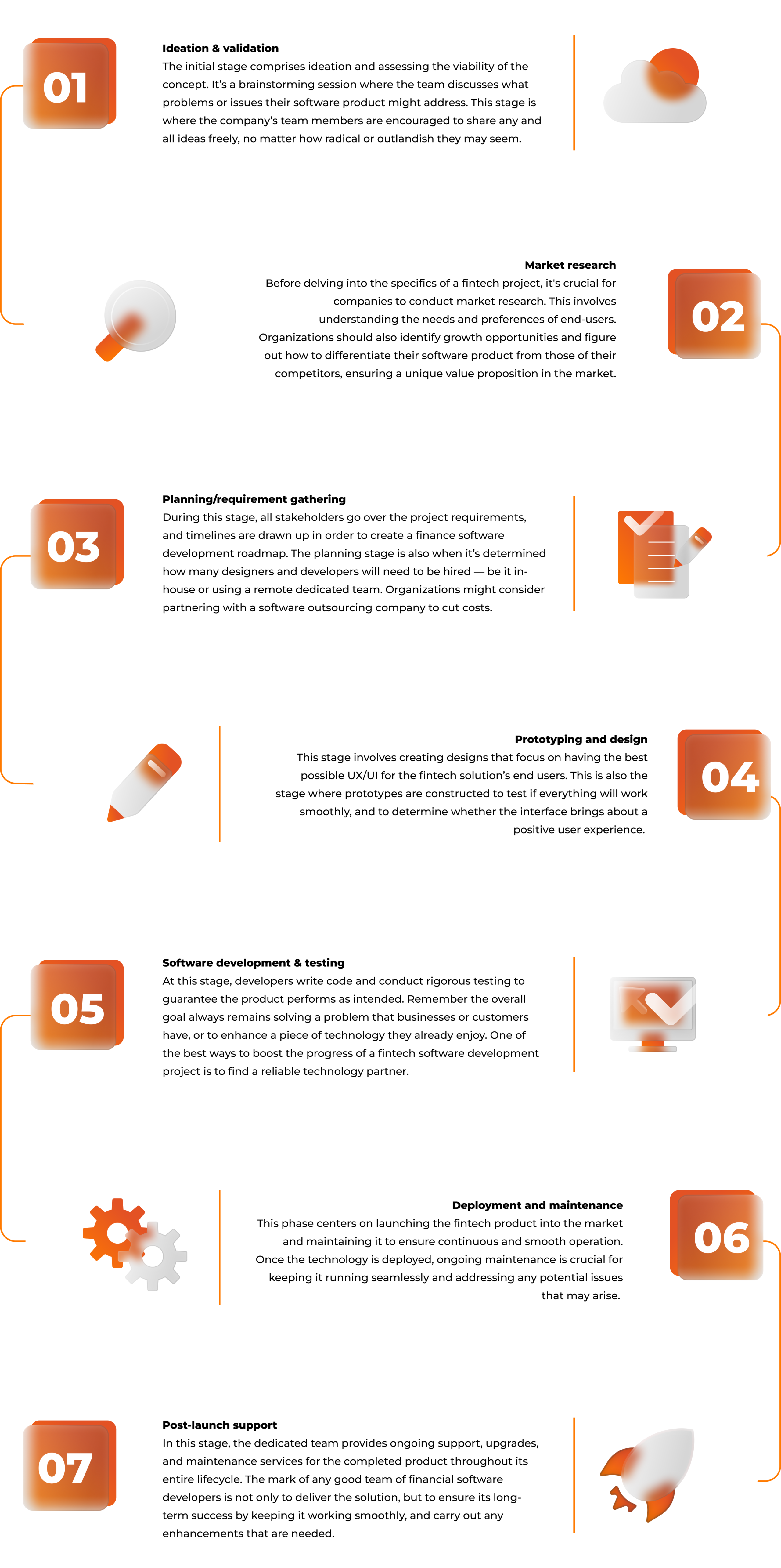Key takeaways
- Companies outside the finance sector are increasingly integrating fintech functionality.
- Online banking, insurance, investment, payment/money transfer, personal finance and crypto apps are the most widely adopted fintech solutions.
- Trends in the financial technology space show a rising enthusiasm for AI/ML, super-apps, embedded finance, neobanks, and sustainable investing.
- When engaging financial software developers, customer success rate and industry-specific expertise are among the key factors to consider.
- The single most important thing about a fintech software development project is vision — work cannot begin until all parties are aligned.
Introduction
Uber and Lyft offer banking services to their drivers. Apple offers its customers credit cards. There is a transformation taking place in financial technology that has industry analysts predicting that in the not-too-distant future, nearly every company will incorporate fintech features. This trend will present opportunities for a wide cross-section of industries: everyone from tech companies and startups to brick-and-mortar banks will focus on financial software development. Every single company – even those that have nothing to do with financial services – will seek to develop fintech features for the first time.
This article is a comprehensive guide on fintech software development, and highlights the most popular use cases and emerging trends. You’ll also learn about how to choose the right financial software developer, and the steps to follow to build your own fintech solution.
What is fintech software development?
The aim of financial software development is to build solutions that make financial transactions easier for customers and lucrative for businesses. Fintech software can help companies cut down on inefficiencies, allow business leaders to make informed decisions that attract new customers and ramp up profits.
For customers, fintech is the reason why we are now able to make international money transfers without paying exorbitant fees, better manage our money with personal finance apps, more easily apply for loans, gain access to the stock market and cryptocurrencies, buy or sell goods on e-commerce platforms, and do banking – all from our mobile phones. The explosion in finance software development has democratized access to financial services in a way never seen before.
Fintech software development use cases
While the applications of financial software development services are limited only by one’s imagination, there are a few well established types of fintech. They include:








Latest financial software developer trends

As the fintech market grows and evolves, new and innovative ways to utilize technology emerge. Here, we delve into the most important fintech trends of 2023.
Embedded finance
Embedded finance apps integrate financial services into businesses that are not typically associated with finance. For example, an online store that sells insurance, or a coffee shop franchise that offers its own credit card. As embedded finance solutions evolve, businesses get more opportunities to encourage purchasing goods and services within their own digital ecosystem.
Artificial intelligence & machine learning
Artificial intelligence and machine learning are used in fintech apps to automate tasks, improve the customer experience, detect potentially fraudulent activities, make precise data-driven predictions, and bring better granularity to analytics. AI systems can monitor billions of transactions in real-time, and ML algorithms can identify patterns with a degree of accuracy exceeding 95%.
Open banking
Open banking lets third-party service providers access financial data from banks and other financial institutions using APIs. Sharing your financial info with another provider allows for greater flexibility in banking, empowering users to move money between bank accounts with ease, better manage their finances, prevent overdraft fees, and provide access to loans.
Neobanks
Operating fully-online, neobanks are a type of fintech software development for people who want their bank to be a fully transactional experience. They offer perks such as budgeting tools and instant money transfers, and charge far lower fees and offer increased accessibility compared to traditional banks. They appeal to younger consumers who prioritize convenience and ease of access above all else.
Sustainable investments
Financial firms are responding to the growing demand for sustainability by introducing services to promote green investments, reduce carbon emissions, and enhance financial inclusion. Green crypto is gaining traction, catering to environmentally conscious investors. For instance, GreenTrust seeks to develop a cryptocurrency that is decentralized, secure, and environmentally mindful.
Buy-now-pay-later
More young consumers are embracing Buy Now Pay Later (BNPL) fintech services, choosing to pay for things in installments rather than with credit cards. With these services, customers can divide purchase costs into multiple payments, often without interest or fees, offering a flexible and appealing alternative to traditional payment methods.
Super-apps
Super-apps are a fintech software development service platform that offers users a personalized experience through a series of mini apps. It is like the Swiss Army knife of apps — customers can visit and carry out an array of shopping, banking and payment activities in one central portal, without having to click away to another site.

How to hire a fintech software development company
By some estimates, there are some 22,000 software development companies globally. With that many out there, some of those companies are going to be better than others. This is why it’s crucial to select a fintech software development company with the greatest of care.
What can happen if you don’t do your homework, or just go for the cheapest vendor out there? You can end up having a negative experience with sub-par developers, project delays, and the added costs that come with having to hire another team to fix faulty software.
Why do some development projects fail? For any number of reasons. Maybe the outsourcing vendor and the client company never aligned as well as they should have. Perhaps the vendor over-promised and under-delivered.
“Most problems stem from some kind of breakdown in communication,” said Thiago Dutra, Director of LatAm Engineering at the software firm AgileEngine. “It’s easy to get off on the wrong foot when the developers and the client have very different ideas about what they’re actually building.”
“There must be a common vision for the product, and that vision must be shared by all involved before work can begin, Dutra said. “Great products are born out of a symbiotic relationship between all parties involved.”
What follows are a few questions you need to seek answers for, so that you can be confident that the fintech software development company you hire will deliver quality and professionalism.
Check the firm’s rate of successfully completed projects
Choose a software development company that has a proven track record of building similar fintech solutions, and has high ratings from their customers. Websites like Glassdoor and Clutch are good places to start your research.
At AgileEngine, we have a 100% success rate on pilot projects. We’ve also developed fintech software development MVPs that resulted in our clients holding successful funding rounds and winning industry awards.
Find out about their technical skills
Ensure that the developer you choose has the necessary technical expertise to build and deliver your fintech software development product.
Every team we assemble is stacked with experts. AgileEngine sources the top 1%-rated UX/UI designers and software developers from top tech hubs in Latin America, Europe, and Asia.
Look into the financial software developer’s reputation
How is the software developer company you’re thinking of hiring regarded by its peers? Are they known for work ethic and prestige, or are there loads of negative reviews from angry and unsatisfied customers? These are crucial questions that need answering before you partner with anyone.
AgileEngine is not only a software development firm held in high esteem – it’s also award-winning in this space. We’ve won awards and accolades from the likes of Gartner, the Deloitte Technology Fast 500, Fortune 500, and many others. Recently, AgileEngine got kudos once again when it was named a Top Firm on the ratings and review website Clutch.
Research their cost effectiveness
While cost-cutting is the main factor behind partnering with a remote financial software developer, companies need to know that they’re getting both quality work and a cost-effective price.
AgileEngine’s scalable dedicated teams have been known to speed up a development project’s cadence by 2x, and do so at 1.5x cost-efficiency compared to in-house teams in the US or Europe.
Discover if they offer quality assurance
Be sure that the software engineering firm has a rigorous QA process in place. QA engineers help ensure that the product they deliver is well-constructed and functions smoothly.
Agile Engine boasts rockstar QA engineers whose testing means that products get to market 30% faster, speed up the regression testing cycle by 7-fold, and can reduce manual testing costs by 3X.
Featured case study
Our experience building fintech tools that reach 186m bank customers
A firm that harnesses user purchasing data to provide targeted advertising needed our help. They approached AgileEngine to assist with integrating mobile and web-based tools, update legacy software, and make UX/UI improvements.
Here’s an example of one of the projects delivered by AgileEngine to one of our clients, a provider of purchase intelligence data to some of the top financial institutions in the US and globally.
Key deliverables
Bank Mobile SDK developed from scratch, speeding up the onboarding of banks
Portfolio Controls and Approval Tool solutions for banks
Bank Web SDK enabling financial institutions to customize campaign look and feel
Activate Campaign Builder and Merchant Approval tools built from scratch, replacing multiple legacy solutions for running promotional and cashback campaigns
Branding and UI components library reusable across multiple apps and platforms
Microservices integrating the customers and offers at a large scale and high level of performance
Optimization of dev process, product scalability, QA workload, and release cadence
Outcomes
Bank Web SDK enabling financial institutions to customize campaign look and feel
Reduced banking institutions’ onboarding time
from weeks to hours
Technologies
- TypeScript
- CSS
- HTML
- Kotlin
- Swift
- Vue.js
- Vuex
- .NET
- .NET Core
- Web APPI
- REST
- Kafka
- Apache Spark
- SQL
- Node.js
- iOS SDK
- iOS
Conclusion
The fintech sector has the potential to greatly impact how modern business is done. Fintech can be adopted by companies in nearly any industry, and holds the promise of attracting a new generation of tech-savvy young customers and creating new revenue streams.
As 2023 draws to a close, organizations from large corporations to tech startups must prioritize fintech software development in the new year, if they are to keep up with their competitors and industry peers.
Building a new software product, or improving an existing one, is no small undertaking, and budgets remain tight in an uncertain economic climate. Companies must rein in cost wherever they can, and that’s why it’s prudent to seek the services of a remote financial software developer.
AgileEngine has a global team of design and software development experts with a track record of creating technology that people love. We specialize in assembling software engineers, designers, project managers and other professionals into teams that are dedicated to helping companies achieve their software development goals.
Get a top-tier dedicated software development team at nearshore prices.
If you’re interested, let’s set up a brief intro call and discuss how AgileEngine can help your organization meet your software development goals in 2024.




